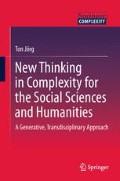Abstract
This is the core chapter of this book, about the complexity of complexity. After all of the rethinking in the preceding chapters, we think we are able to present a different notion and concept of complexity that can lead to a new way of thinking in complexity. We intend to develop a way of thinking in complexity that goes beyond the complexity as taken for granted in the field of our social sciences and humanities.
Access this chapter
Tax calculation will be finalised at checkout
Purchases are for personal use only
Notes
- 1.
In Wendell Berry, in Vitek and Jackson 2008, “The Virtues of Ignorance”, p. 37 (emphasis added).
- 2.
What are really fundamental and also general in this are causality itself (Smolin 2006, p. 241) and the underlying causal processes and relations of causality (Smolin 2006, p. 244). Interestingly, the importance of causality in this seems similar to understanding the fundamental role of causality in understanding of the new physics of spacetime (see Smolin’s Chap. 15). This makes our approach a real trans-disciplinary one.
- 3.
Originally published in 1817. See Craig Holdrege, in Vitek and Jackson 2008, The Virtues of Ignorance, p. 332.
- 4.
“The straight line leads to the end of humanity/mankind” (own translation).
- 5.
We may stress, again, that recursion not only has the meaning of repetition but also that of a reversing of effects like in reciprocal interaction with reciprocal influences (see Chap. 11, about the meaning of non-recursive relationships).
- 6.
What are really fundamental and also general in this are causality itself and the underlying causal processes and relations of causality (Smolin 2006, pp. 241, 244). Interestingly, the importance of causality in this seems similar to understanding the fundamental role of causality in understanding of the new physics of spacetime (see Smolin’s chapter 15). This makes our approach a real transdisciplinary one. We return to this topic in the last chapter.
- 7.
Susan Oyama links this dogma here to a publication of Francis Crick (1957).
References
Alexander, C. (2002). The nature of order: The process of creating life, Book two. Berkeley: The Center for Environmental Structure.
Bohm, D., & Peat, D. M. (2000). Science, order, and creativity (2nd ed.). London: Routledge.
Brockman, J. (1995). The third culture: Beyond the scientific revolution. New York: Simon and Schuster.
Davis, B. (2004). Inventions of teaching: A genealogy. Mahwah: Lawrence Erlbaum Associates.
Deaux, K., & Philogene, G. (2001). Epilogue. In K. Deaux & G. Philogene (Eds.), Representations of the social. Oxford: Blackwell Publishers.
Eigen, M., & Schuster, P. (1979). The hypercycles: A principle of natural selforganization. Berlin: Springer.
Follett, M. P. (1924). The creative experience. See also Drucker et al., 1995. Also (partly) retrievable via: http://www.follettfoundation.org/writings.htm
Kauffman, S. (1993). The origins of order. Self-organization and selection in evolution. Oxford: Oxford University Press.
Keller, E. F. (1985). Reflections on gender and science. New Haven: Yale University Press.
Lincoln, Y. S., & Guba, E. G. (1985). Naturalistic inquiry. Beverly Hills: Sage Publications.
Lord, B. (1994). Teacher’s professional development: Critical colleagueship and the role of professional communities. In N. Cobb (Ed.), The future of education (pp. 175–204). New York: College Board Publications.
Luhmann, N. (2002). Theories of distinction. Stanford: Stanford University Press.
Maturana, H. R., & Varela, F. J. (1980). Autopoiesis and cognition: The realization of the living. Dordrecht: Reidel Publishing Company.
Morin, E. (2002). A propos de la complexité. Available at: http://www.litt-and-co.org/philo.textes.htm
Morin, E. (2007). Restricted complexity, general complexity. In C. Gershenson, D. Aerts, & B. Edmonds (Eds.), Worldviews, science and us: Philosophy and complexity (pp. 5–29). Singapore: World Scientific.
Oyama, S. (1989). Ontogeny and the central dogma: Do we need the concept of genetic programming in order to have an evolutionary perspective? In M. R. Gunnar & E. Thelen (Eds.), Systems and development (pp. 1–34). Hillsdale: Lawrence Erlbaum Associates.
Oyama, S. (2000). Evolution’s eye. Durham: Duke University Press.
Reid, R. (2007). Biological emergences: Evolution by natural experiment. Cambridge: The MIT Press.
Rescher, N. (1998). Complexity: A philosophical overview. New Brunswick: Transaction Publishers.
Rosen, R. (2000). Essays on life itself. New York: Columbia University Press.
Ruurlo Manifest (2006). Crossing boundaries to New Horizons (Declaration of the Founders Meeting of the ‘Institute Para Limes’). Retrieved at http://wmstest.com/about_ipl_history.htm
Sassone, L. A. (1996). Philosophy across the curriculum: A democratic Nietzschean pedagogy. Educational Theory, 46(4), 511–524.
Scheffer, M. (2009). Critical transitions in nature and society. Princeton: Princeton University Press.
Senge, P. (1990). The fifth discipline. New York: Doubleday.
Smolin, L. (2006). The trouble with physics. Boston: Houghton Mifflin Company.
Stanley, D. (2005). Paradigmatic complexity: Emerging ideas and historical views of the complexity sciences. In W. C. Doll Jr., M. J. Fleener, D. Trueit, & J. St.Julien (Eds.), Chaos, complexity, curriculum, and culture (pp. 133–151). New York: Peter Lang.
Starobinski, J. (2003). Action and reaction: The life and adventures of a couple. New York: Zone books.
Ulanowicz, R. (2009). A third window: Natural life beyond Newton and Darwin. West Conshohocken: Templeton Foundation Press.
Valsiner, J. (1998). The guided mind. Cambridge: Harvard University Press.
Vitek, B., & Jackson, W. (Eds.). (2008). The virtues of ignorance: Complexity, sustainability, and the limits of knowledge. Lexington: The University Press of Kentucky.
Von Foerster, H. (1993). Understanding understanding. New York: Springer.
Vygotsky, L. (1987a). Thought and language (A. Kozulin Ed. & Trans.). Cambridge (MA): The MIT Press.
Vygotsky, L. (1987b). In R.W. Rieber & A.S. Carton (Eds.), The collected works of L.S. Vygotsky (Problems of general psychology, Vol. 1). New York: Plenum Press.
Wimsatt, W. C. (2007). Re-engineering philosophy for limited beings: Piecewise approximations to reality. Cambridge: Harvard University Press.
Author information
Authors and Affiliations
Corresponding author
Rights and permissions
Copyright information
© 2011 Springer Science+Business Media B.V.
About this chapter
Cite this chapter
Jörg, T. (2011). The Complexity of Complexity. In: New Thinking in Complexity for the Social Sciences and Humanities. Springer, Dordrecht. https://doi.org/10.1007/978-94-007-1303-1_13
Download citation
DOI: https://doi.org/10.1007/978-94-007-1303-1_13
Published:
Publisher Name: Springer, Dordrecht
Print ISBN: 978-94-007-1302-4
Online ISBN: 978-94-007-1303-1
eBook Packages: Humanities, Social Sciences and LawSocial Sciences (R0)

